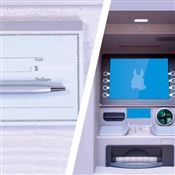Joint Account Definition
Pooling your money with a significant other or business partner can be tough. Learn how a joint bank account can help - plus pros and cons of opening one.
 |
Combining finances can get tricky. Who pays which bills? And how do you keep track?
If you're looking for a better solution, it may be time for a joint account.
Owning an account with your significant other can make finances more convenient. But there are some common pitfalls to watch out for. Learn the basics of joint accounts below.
What is a Joint Account?
A joint account is a bank account owned by two or more people.
In most cases, they are shared by married couples. Business partners or other relatives, such as parents and child, may also own an account together.
Most joint accounts give everyone on the account equal access to the funds. All owners (people listed on the account) can make deposits or withdrawals. However, some joint accounts have different parameters (more on this below).
How Do Joint Accounts Work?
Joint accounts work just like individual accounts, except that two or more people have account access.
If you have a joint checking account, for example, all owners are named on the checks. All owners can write and cash checks, as well. Similarly, all owners can deposit or withdraw funds without the approval of anyone else.
If the account comes with a debit card, all owners can use the debit card without asking the other. It doesn't matter who deposited the funds - everyone has equal access to them.
Joint accounts are great for couples or relatives who share expenses, but make sure you only open a joint account with someone you know and trust.
All owners of a bank account own the money. The bank doesn't ask for proof of who deposited which funds. For example, if you deposit $1,000 in a joint checking account that you own with your brother, both you and your brother have equal access to the $1,000 even though you deposited it.
What is the Benefit of a Joint Account?
A joint bank account has many benefits, but most of all, it provides simplicity. When you share expenses with another person, it's easier to manage the expenses from a joint account rather than trying to split the expenses fairly.
Other benefits of joint accounts include:
- Easier to waive monthly minimums: If two people deposit their earnings into an account, it's easier to meet the minimum monthly requirements to waive the monthly fees.
- Helpful for seniors: As seniors age, they often want help with their finances. Naming a relative on their account makes it easier for the relative to handle their loved ones finances without having to bother the senior to get approval for deposits or withdrawals.
- Higher FDIC insurance coverage: When you and a partner own a bank account together, you each get $250,000 in FDIC insurance coverage, which means your account is covered up to $500,000 rather than just $250,000 for a single owner
Some banks may label one account holder as the "primary account holder," but that doesn't give that person more responsibility or rights than the other. All owners have equal access to the funds and the account itself.
What are the Downsides of a Joint Account?
Joint accounts have their downsides because all parties have equal access to the funds.
- Tricky for partners with different financial habits: lt could be tricky for partners with different financial habits. If one owner has spending habits and spends more than he/she should.
- Everyone is on the hook for fees: For example, if you own a bank account with your business partner and he overdrafts the account, it costs both of your money, not just him.
- You could be liable for other's mistakes: If one owner has financial trouble and ends up with a judgment that allows the creditor to seize the bank account, they could take ownership of the account with even if the other owners weren't a party in the issue.
How Do Joint Bank Accounts Work in Business?
Joint business bank accounts work the same as personal joint bank accounts. Both partners have equal access to the funds. Before you open a joint account with a business partner, it's important to outline the "rules" beforehand.
Decide together how the funds will be managed, who can withdraw funds and when, and how any problems will be handled.
While it may feel uncomfortable to have these difficult conversations, it's important so you don't ruin your business relationship and your finances when trouble occurs.
Joint Account Rules
Joint bank accounts have more than one owner, so understanding the rules is important:
- All account owners own the money. Even if one person is the "primary" account holder, everyone has equal rights.
- Any account holder can close the account.
- No one can remove another account holder from the account without their consent.
- All owners are liable for any taxes incurred from the interest earned in a joint bank account.
When one joint bank account holder dies, the other owner typically takes full ownership of the account. If there is more than one surviving owner, the funds get divided equally between the owners.
In some cases, joint accounts are held as "tenancy in common." In this case, the account would be split in half, with the deceased owner's half going to his/her estate and the other 50% remaining with the surviving owner.
Joint Account Requirements
To open a joint account, all parties will need specific information including:
- Name, address, and Social Security number
- Photograph IDs to prove your identity
- Decide how you'll hold the account to plan for separation or death
Types of Joint Accounts
The type of joint account you have determines how the funds are handled upon your death.
Joint Tenants with Rights of Survivorship
If you own the account as joint tenants with rights of survivorship, the assets remain outside of probate and go to the surviving spouse.
Tenants in Common
If you own the account as tenants in common, each party chooses their beneficiaries and the funds designated for the deceased go to the beneficiaries.
When you set up the account, you determine how the funds will be split should one die. It may be 50/50, but it doesn't have to be.
Joint Tenants
This means the funds are split 50/50 and go to each person's beneficiaries upon their passing.
How to Open a Joint Bank Account
Opening a joint bank account is much like opening a solely owned bank account. Use these steps to open your joint account.
- Choose the bank or credit union where you'll hold the account: Together decide where your money should go. Look at the benefits, accessibility, and fees of opening an account there.
- Get your identification ready: All parties must prove their identity with a driver's license, state ID, or passport.
- Complete an application: Together, complete the application with all owners' information, including Social Security numbers.
- Decide the type of account: Choose how you'll own the account, thinking about how you'll handle the funds if one owner dies.
- Fund the account: Determine the minimum deposit required to open an account and/or avoid maintenance fees. Together make a deposit or decide who will first fund the account.
- Talk about how you'll handle the account: If you haven't done so yet, now is a great time to talk about how you'll handle the funds. Who has the right to withdraw funds, who will deposit funds, and how will you communicate about the account?
Bottom Line: Is a Joint Bank Account Right for You?
Joint bank accounts can be great in perfect relationships, and tough when things go south. Before opening a joint account with anyone, think about how you'll handle disagreements, separation, or death.
It's a good idea to only open a joint account with someone you know you can trust and who won't get sneaky about how he/she uses the funds. While there are many benefits to holding an account together, there are just as many risks, so give it careful thought before opening one.
Write to Sam Hawrylack at feedback@creditdonkey.com. Follow us on Twitter and Facebook for our latest posts.
|
|
|









